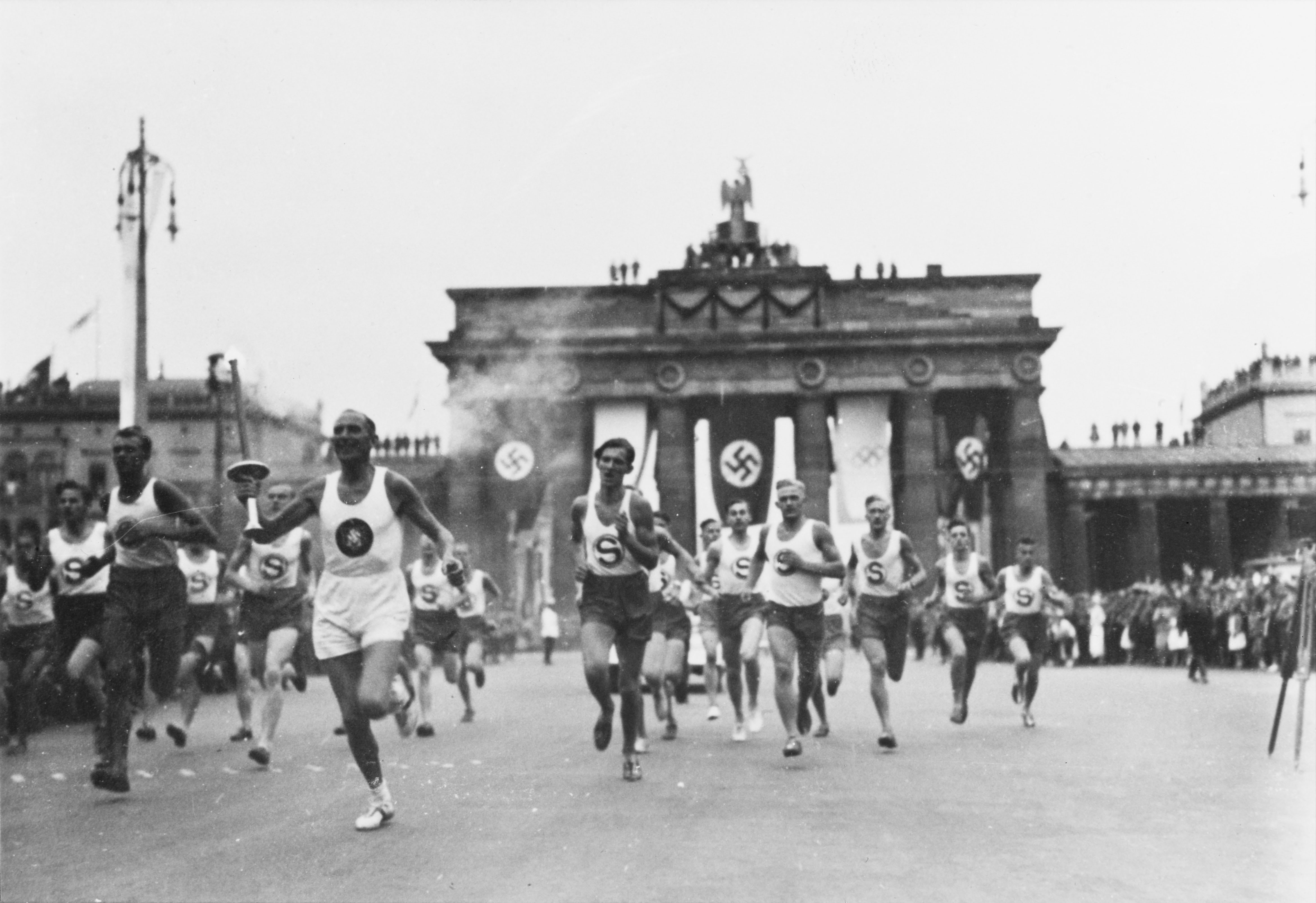War, economics, and prejudice: The hidden competitors of the Olympic Games
It's never just about global unity and friendly competition


A free daily email with the biggest news stories of the day – and the best features from TheWeek.com
You are now subscribed
Your newsletter sign-up was successful
The Olympic Charter outlines the driving philosophy behind the Olympic Games: to create an event "without discrimination of any kind, such as race, color, sex, sexual orientation, language, religion, political or other opinion."
It's a beautiful sentiment. And the Olympics always fails to live up to it.
Instead, the Olympics are nearly always bound inextricably to the problems plaguing the world and era they occur in, with the Games often betraying whatever global anxieties we're consumed with.
The Week
Escape your echo chamber. Get the facts behind the news, plus analysis from multiple perspectives.

Sign up for The Week's Free Newsletters
From our morning news briefing to a weekly Good News Newsletter, get the best of The Week delivered directly to your inbox.
From our morning news briefing to a weekly Good News Newsletter, get the best of The Week delivered directly to your inbox.
In the sixth installment of the modern Olympics, for instance, international politics quickly disposed of the IOC's vision of a politics-less Games. Stockholm won the rights to host the 1912 Games by striking a deal with Berlin, the German capital, where the latter would be guaranteed the 1916 Games. But after Gavrilo Princip's fateful shot sparked World War I in 1914, Germany found itself aligned with the Central Powers and the 1916 Games were cancelled due to war.
World War I ravaged Europe. At least 8.5 million fighters perished, and nearly an entire generation of young men was lost to war. The tiny European nation of Belgium, caught between larger powers like France and Germany, lost more than 13,000 members of its mobilized forces during World War I, a casualty rate of nearly 35 percent. The country's occupation by Germany during the war was so devastating it came to be known as "The Rape of Belgium," wherein German forces violated Belgian neutrality en route to killing more than 5,000 civilians.
When the Olympics resumed in 1920, the Games were awarded to Antwerp, Belgium, in a move intended to memorialize the trauma inflicted upon the country during World War I. The war's losing Central Powers — Germany, Turkey, Austria, Hungary, and Bulgaria — were not invited to attend.
Despite suffering from an unfinished stadium and sparse attendance due to post-war economic woes, Belgium was praised for its resilience and embodiment of the Olympic spirit by hosting the Games. "Naturally, the nations like England, France, Belgium, Canada, and Australia are still feeling the ravages of the World War," The New York Times wrote on Aug. 25, 1920, in the middle of the Games. "However, they have shown wonderful recuperative powers."
A free daily email with the biggest news stories of the day – and the best features from TheWeek.com
War continued to be an influential factor in Olympic history, most notably during the 1936 Games, which were awarded to Berlin in a gesture meant to soothe leftover tensions from World War I and welcome Germany back into the international fold. But the IOC made that decision in 1931, two years before Adolf Hitler and the Nazis took power; by 1936, Hitler had turned Germany into a cesspool of racial hatred on the verge of mass genocide. The watching world balked as the Nazis prepared for the Olympics by deliberately scrubbing Berlin of its most overt anti-Semitic imagery and banning Jewish athletes from the German national team.
Calls to boycott the Games grew loud, led by the U.S. and U.K., but the movement eventually crumbled. Germany went on to win the most medals at the Berlin Games, and the success "dulled the opposition to [Hitler] that had clearly been quite evident up to 1936," Carnegie Mellon University history professor Barbara Burstin told Time earlier this month. Nazi Germany invaded Poland almost exactly three years later.
The legitimacy lent to Nazi Germany by the 1936 Olympics helped lead to World War II — which, in turn, led to the cancellation of the 1940 Games, scheduled to be held in Tokyo, and 1944 Games, set to be hosted in London. The "make-do-and-mend" 1948 Games in London were the world's second attempt to reset after an all-consuming crisis, and the Olympics' return for the first time since 1936. Axis powers Germany and Japan were banned from competition, and postwar economic turmoil led to the moniker "The Austerity Games," with London's Olympics deemed a stripped-down-but-successful event.
But the 1948 Games reflected the world's no-frills mood: As History noted, no new venues were constructed for the 1948 Olympics, many local athletes simply commuted from home to their events via public transportation, and rationing drove many competitors to make their own uniforms. When the Games closed, the Manchester Guardian boasted: "Right from the start, it was made clear to the athletes that this time there was to be no glorification of any political system, any nation, any color," likely a thinly-veiled reference to Hitler's stage-setting 1936 Games.
Perhaps no two Games better captured the world's problems than the 1968 Olympic Games in Mexico City and the 1972 Olympic Games in Munich. Throughout the 1960s, the U.S. struggled with racial tensions as the civil rights movement swept through the country. And just as Jesse Owens made a racial statement from the podium in Berlin in 1936, U.S. runners Tommie Smith and John Carlos staged a silent protest after the 200-meter event, thrusting their fists in the air in the Black Power salute.
Smith and Carlos were vilified by Americans appalled that the athletes had taken a such a stand in front of the world; the two men were banned from Team USA. "We knew that what we were going to do was far greater than any athletic feat," Carlos said in 2006.
In 1972, international affairs crept tragically into the Olympic Village. While the 1960s and 1970s saw Cold War tensions simmer ominously and the Vietnam War trudge on, the Middle East was consumed by the growing Israeli-Palestinian conflict. The Palestinian Liberation Organization was formed in 1964, and the Six-Day War of 1967 saw Israel occupy much disputed territory, including the Sinai Peninsula, the Gaza Strip, and the Golan Heights. After attempting a hands-off approach, the U.S. under President Lyndon B. Johnson eventually brokered a muddled resolution through the United Nations that did little to clarify whose territory was whose.
As a result, by the time the Munich Olympics rolled around in 1972, guerilla warfare had broken out in the region and the PLO had established its presence in Lebanon. The Olympic Village, the brainchild of IOC founder Pierre de Coubertin, had long been a melting pot for the world's athletes to mingle in a fun, shared living space. But at the Munich Games, the communal space proved vulnerable to violence. Palestinian terrorists stormed the Israelis' living quarters and took nine athletes hostage after killing two, demanding freedom for more than 200 Arab prisoners who were being held in Israeli jails. The nine hostages died in a subsequent rescue attempt.
The 1980 and 1984 Summer Olympics traded boycott efforts by the U.S. and Soviet Union, joined by respective supportive nations, over the Cold War. (The 1980 Winter Games featured the memorable "Miracle on Ice" victory of the American hockey team over the Soviets.) While Cold War tensions effectively froze after the fall of the Berlin Wall in 1989, the granting of the 2014 Winter Olympics to the Russian seaside city of Sochi coincided with renewing fears in the West of an emboldened Russia; Mitt Romney, the Republican nominee for president in 2012, called Russia the "greatest geopolitical foe" facing America.
Sochi was awarded the Games in July 2007; in October, Russia announced it would withdraw the troops it had kept in the neighboring nation of Georgia after 16 years, retaining only a "peacekeeping presence in Abkhazia and South Ossetia," CNN reported. But in 2008, Russia invaded Georgia after claiming the nation was planning an attack, in a move The New York Times said "had wide international implications, as both Russian and Georgian officials placed it squarely in the context of renewed Cold War-style tensions and an East-West struggle for regional influence."
By the time the 2014 Olympics opened in Sochi, the country's anti-gay laws and propaganda led to protests and boycott movements by human rights activists, in addition to protests over the 2008 war. Russian President Vladimir Putin used the Games as a show of strength, spending a record $51 billion on preparation, staging an elaborate closing ceremony — and, as was later uncovered, sanctioning a widespread state doping scandal to ensure Russia would top the Games' medal count (which it did, with 33 medals).
Thomas Bach, the president of the IOC, specifically thanked Putin for the "extraordinary success of these Winter Games" when they closed on Feb. 23, 2014. One month later, Russia annexed Crimea.
Which brings us to the 2016 Summer Olympics. The Games have been marred by Brazil's economic downturn, political corruption, and outbreak of disease. Facilities were unfinished, venues potentially viral. The country's president was impeached during the final months of Olympics preparations, and the state of affairs leading up to Rio was, by all accounts, a disaster.
But in so many ways, the problems of Rio are what the world sees when it holds a mirror to its face.
The world outside Brazil is in the midst of upheaval. Extreme ideology has swept the globe, from Donald Trump's sharply polarizing rhetoric to the Brexit vote to increasing right-wing fervor across Europe. The threat of Islamic extremism looms, with lone wolf attacks joining organized chaos in terrorizing the West. Turkey, NATO's key member state in the Middle East, underwent a failed coup that cost thousands upon thousands of civilian lives last month.
The Olympics cannot escape the shadow of the world they aim to unite. They seldom embody that platonic Olympism, which strives for universal greatness and spirit unmarred by global constraints.
But maybe that's why we need them.
Kimberly Alters is the news editor at TheWeek.com. She is a graduate of the Medill School of Journalism at Northwestern University.
-
 How the FCC’s ‘equal time’ rule works
How the FCC’s ‘equal time’ rule worksIn the Spotlight The law is at the heart of the Colbert-CBS conflict
-
 What is the endgame in the DHS shutdown?
What is the endgame in the DHS shutdown?Today’s Big Question Democrats want to rein in ICE’s immigration crackdown
-
 ‘Poor time management isn’t just an inconvenience’
‘Poor time management isn’t just an inconvenience’Instant Opinion Opinion, comment and editorials of the day
